

“Oxytocin Hormone Inhalation” Improves Social Learning In People with Aspergers. A recent study published in the “Proceedings of the National Academy of Science” is the first to demonstrate the effects of oxytocin, a hormone that allegedly promotes mother-infant bonding, socialization, trust and cooperation. Researchers stated that Aspies showed dramatic improvement in their social learning ability subsequent to inhalation of this “socialization-eliciting” hormone.
The results of this study influenced several Aspergers specialists to speculate that when usually depleted levels of oxytocin among Aspies are supplemented, it may benefit their social interactive skills. The study was related to the Aspie’s tendency to avoid eye contact with others. In this study, 13 participants with Aspergers - and a control group - were quizzed about photos of human faces. Sexual hook-up culture. Welcome to ‘CE Corner' "CE Corner" is a quarterly continuing education article offered by the APA Office of CE in Psychology.
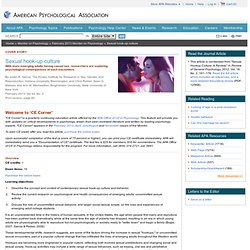
This feature will provide you with updates on critical developments in psychology, drawn from peer-reviewed literature and written by leading psychology experts. "CE Corner" appears in the February 2012, April, July/August and November issues of the Monitor. To earn CE credit, after you read this article, purchase the online exam. Upon successful completion of the test (a score of 75 percent or higher), you can print your CE certificate immediately. Overview CE credits: 1 Exam items: 10 Purchase the online exam Learning objectives: Describe the concept and context of contemporary sexual hook-up culture and behavior. It is an unprecedented time in the history of human sexuality. Hookups are becoming more engrained in popular culture, reflecting both evolved sexual predilections and changing social and sexual scripts.
A cultural revolution Affective responses to hooking up. Research hints at a potential future treatment for autism. European researchers have hinted it might be possible to reverse some of the brain changes in autism.
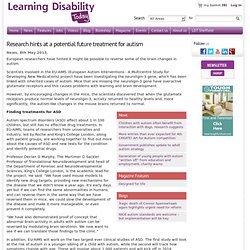
Scientists involved in the EU-AIMS (European Autism Interventions - A Multicentre Study for Developing New Medications) project have been investigating the neuroligin-3 gene, which has been linked with inherited cases of autism. Mice that are missing the neuroligin-3 gene have overactive glutamate receptors and this causes problems with learning and brain development. However, by encouraging changes in the mice, the scientists discovered that when the glutamate receptors produce normal levels of neuroligin-3, activity returned to healthy levels and, more significantly, the autism-like changes in the mouse brains returned to normal. Finding treatments for ASD Autism spectrum disorders (ASD) affect about 1 in 100 children, but still has no effective drug treatments. In addition, EU-AIMS will work on the two largest ever clinical studies of ASD. Narcissistic Personality Disorder Symptoms. The symptoms of narcissistic personality disorder include: grandiose sense of importance, preoccupation with unlimited success, belief that one is special and unique, exploitative of others, lacks empathy, is arrogant, and is jealous of others.
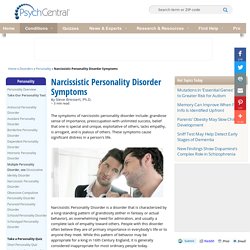
These symptoms cause significant distress in a person's life. Narcissistic Personality Disorder is a disorder that is characterized by a long-standing pattern of grandiosity (either in fantasy or actual behavior), an overwhelming need for admiration, and usually a complete lack of empathy toward others. People with this disorder often believe they are of primary importance in everybody’s life or to anyone they meet. Narcissistic personality disorder. Symptoms[edit] Some people diagnosed with a narcissistic personality disorder are characterized by exaggerated feelings of self-importance.
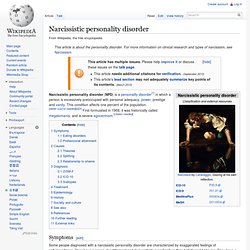
They have a sense of entitlement and demonstrate grandiosity in their beliefs and behavior. Impulse control disorder. Impulse control disorder (ICD) is a class of psychiatric disorders characterized by impulsivity – failure to resist a temptation, urge or impulse that may harm oneself or others.
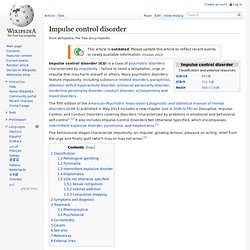
Many psychiatric disorders feature impulsivity, including substance-related disorders, paraphilias, attention deficit hyperactivity disorder, antisocial personality disorder, borderline personality disorder, conduct disorder, schizophrenia and mood disorders. The fifth edition of the American Psychiatric Association's Diagnostic and statistical manual of mental disorders (DSM-5) published in May 2013 includes a new chapter (not in DSM-IV-TR) on Disruptive, Impulse-Control, and Conduct Disorders covering disorders "characterized by problems in emotional and behavioral self-control".[1] It also includes Impulse-Control Disorders Not Otherwise Specified, which encompasses intermittent explosive disorder, pyromania, and kleptomania.[1] Classification[edit]
Sexual addiction. Sexual addiction (sometimes called sex addiction) is a conceptual model devised in order to provide a scientific explanation for sexual urges, behaviors, or thoughts that appear extreme in frequency or feel out of one's control—in terms of being a literal addiction to sexual activity.
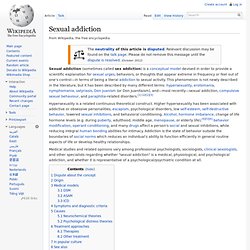
This phenomenon is not newly described in the literature, but it has been described by many different terms: hypersexuality, erotomania, nymphomania, satyriasis, Don Juanism (or Don Juanitaism), and—most recently—sexual addiction, compulsive sexual behaviour, and paraphilia-related disorders.[1]:12[2][3] Hypersexuality is a related continuous theoretical construct. Higher hypersexuality has been associated with addictive or obsessive personalities, escapism, psychological disorders, low self-esteem, self-destructive behavior, lowered sexual inhibitions, and behavioral conditioning.
Dispute about the concept[edit] Science largely fails to support the addiction model. Origin[edit] Medical models[edit] DSM[edit] Recent Publications.